EUROPARC’s Seminar Dialogue with the European Commission 2022
Seminar Dialogue 2022
Following the successful Seminar-Dialogues organised in 2017, 2018, 2019, 2020 and 2021, on the 15 and 16th of November 2022 13 EUROPARC and Protected Areas representatives and 12 Officers from the European Commission met for a dialogue.
By bringing together representatives of the European Commission and Protected Area professionals, EUROPARC aims to put a spotlight on the contribution of Protected Areas to the achievement of the European policy goals, whilst giving the European Commission a clear insight of the challenges faced by professionals in the field.
‘Seminar Dialogue’ is an opportunity to give a voice to nature within the European commission and highlight the importance of Protected Areas.
• The new Restoration law: the role of, and the impact on, Protected Areas;
• Nature Conservation in the Climate change context
The programme, the report and the photo album are available here:
Programme Seminar Dialogue 2022
Photo Album Seminar Dialogue 2022
The event with the European Commission was anticipated by an internal networking meeting for EUROPARC members, on the 15th of November. It provided participants with the opportunity to share expectations from the Seminar with the Commission, to refresh their knowledge of the complex institutional structure of the EU, and discover how the EUROPARC Brussels Office interacts with the European key actors in its lobby and advocacy work.
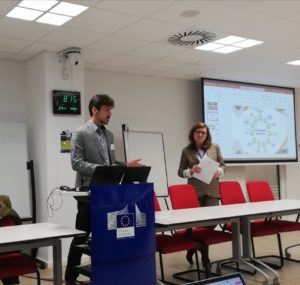
EUROPARC President Michael Hošek opens the 2022 Seminar Dialogue.
Restoration Law
The 16th of November started with a welcome from the (acting) Head of Unit D.3 – Nature Conservation, DG Environment, Luisa Samarelli and EUROPARC President Michael Hošek. Participants then received a quick update on the implementation of the EU Biodiversity Strategy for 2030 and a presentation of the Commission’s proposal of the new Nature Restoration law.
The proposal outlines that:
- by 2030 restoration measures will cover 20% of EU’s land and sea;
- by 2050, measures will be in place for ALL ecosystems in need of restoration.
The proposal of the law details the targets connected with the Habitats and Birds Directives, more other sectors/habitats, identified as essentials, e.i. the urban ecosystems. The text of the Commission’s Proposal for a Nature Restoration Law is available in English here.
The EU level PAF: Funding needs and opportunities for nature
Conservation and restoration need resources! Przemek Oginski, DG ENV, introduced the “EU level PAF: Funding needs and opportunities for nature”.
He introduced the estimations of the financial needs for Natura 2000 in the current EU long-term budget (also known as Multi-annual Financial Framework – MFF) running from 2021 to 2027. The Commission analysed if, and how, the financial resources devoted to biodiversity in different programmes were successful and effective. During the French presidency of the Council, an important proposal has been made, for a new large financial investment in nature protection and restoration for the next MFF.
Nature Restoration – The role of Protected Areas
The Protected Areas’ perspectives were introduced by, João Cardoso de Melo – from Cascais Ambiente (PT) – and member of the EUROPARC Council. He shared the results of the Siggen Seminar 2022 “Nature Restoration – The role of Protected Areas”, where 11 experts from all over Europe came together to discuss the role Protected Areas have to play in the restoration process. Over the course of two days, participants worked in teams to find answers to the questions:
- What are the benefits of nature restoration for communities?
- How can we implement nature restoration (from a governance perspective)?
- What are the key roles of Protected Areas (managers) in nature restoration? How can restoration projects be set up?
Finland’s Parks: experiences and lessons learnt in identifying restoration priorities and actions
Henrik Jansson, Director of Parks & Wildlife, Metsähallitus – (FI) presented the experiences of Finland’s Parks and lessons learnt in identifying restoration priorities and actions. For years, Finland has been engaged in habitat restoration. The topic is very important in the country, especially for the connection with the forestry sector, and one of the challenges is to find a compromise between conservation and economical use of the Finnish forest heritage.
White paper: Protected Areas and the European strategies for climate change adaptation and biodiversity
The EUROPARC Climate Change Task Force has been working on the preparation of the white paper: Protected Areas and the European strategies for climate change adaptation and biodiversity. The key messages were shared by Olivier De Sadeleer, project manager of the Natur’Adapt Project. Climate change defies us to take into account the big uncertainty on the future, in all strategies and actions for biodiversity, at all levels, inside and outside Protected Areas. These concepts are already included in the planning work of Brussels Environment Agency (BE) as showed in the presentation of the Case study: Climate change adaptation into the management of natural heritage sites, regional parks and forest in Brussels (BE)
Dialogue with the research and scientific sectors – NaturaConnect
The dialogue with the research and scientific sector is necessary for the implementation of the EU policies, especially in a climate change context. This will be one of the aspects of the new EUROPARC project ‘NaturaConnect’, introduced by the project manager Marit Schnepf.
Climate Policy Developments Relevant for Protected Areas
For the European Commission Perspectives, Peter Loeffler, DG CLIMA, shared an update about the Climate Policy Developments Relevant for Protected Areas. It is positive to note, that the decision makers in EU and at international level have started to agree about the connection on climate change, biodiversity and human health.
Guidance on climate change and Natura 2000
To support the Protected Area managers in dealing with climate change in Natura 2000 sites, the Commission is preparing a new guidance on climate change and Natura 2000. Participant Stefania Charisiadou, DG ENV, updated the participants about this process.
You can find all the presentations at the bottom of the page here.
Meet our Star Award Winner: Hotel Ristorante La Pieja
On the 2nd of December, we awarded the Star Award winners 2021/22 during our ECST and Star Award Ceremony in the European Parliament. Keep on reading to know the overall winner, Ristorante La Pieja!
Congratulations! Star Awards winner in the category “Global approach to sustainability”
The International Jury decided to award the Hotel Ristorante La Pieja (IT) as the overall winner of the STAR Awards 2021-2022 edition for their comprehensive approach to sustainability. Hotel Ristorante La Pieja has been the only one to candidate to all four categories with consistently strong performance across all four.
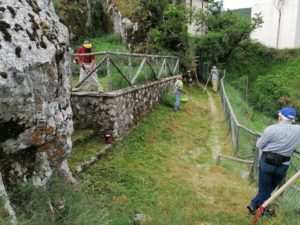
Trail cleaning done by La Pieja
The hotel and restaurant La Pieja wants to create an “Economy of well-being” centred around enjoyment and conservation of nature in the area of the Abruzzo National Park. To make that goal a reality, they have created an integrated offer for tourists, that includes
nature, culture and outdoor activities. All of this is done in close cooperation with other local operators, guides, and museums. La Pieja regularly meets with the Abruzzo Park Authority and local producers to create common objectives and commitments that ensure
adherence to ecological standards.
To create this “economy of well-being”, staff of the hotel also regularly participate in restoration activities. These range from removing waste along hiking paths, promoting the restoration of historical objects that are characteristic for the landscape, or creating educational workshops.
Furthermore, La Pieja actively promotes the nature and territory of the Abruzzo National Park.
They do so by providing brochures in the guest rooms and adding the Park’s offers to the bulletin board. Hotel staff also work on “education” visitors by distributing rules on how to behave in the natural area. Moreover, they organise special seasonal activities, for example walks during deer mating season, excursions to examine the traces left by different speciesof animals, or the fall photography contest, aimed at capturing the autumn landscape of
the Park.
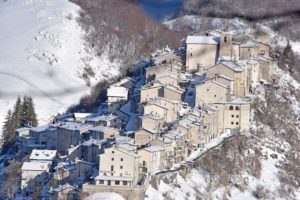
Hotel Restaurant La Pieja in its surroundings
Inside the hotel and restaurant, this attention to the needs of nature continue. The menu of the restaurant is composed of local and seasonal ingredients, some of which are ‘0 km produce’. The gardens surrounding the building are planted with native species, and only
eco-friendly fertilisers and insect detergents are used. Moreover, light pollution is kept to a minimum through the use of motion activated sensors. Attention is paid to the needs of the local community, to encourage moments of aggregation and promote the local economy.
All these efforts have led to the Hotel Ristorante La Pieja being our overall Star Award 2022 winner!
ECST & Star Award Ceremony 2022 – meet the new Parks and Businesses!
On the second of December 2022, EUROPARC was able to honour the Protected Areas, businesses and tour operators that are creating Sustainable Tourism at the ECST and Star Award Ceremony in Brussels.
Take a look at the album to see all the photos from the event:
If you would like to download the photos, you can find them here.
About the event
For the first time since the start of the pandemic, EUROPARC was able to recognise all those that successfully applied to the European Charter for Sustainable Tourism (ECST) at the European Parliament. We were kindly hosted by Member of Parliament Marie Toussaint. What made it even more special, is that we also awarded our Star Awards to sustainable businesses working in and around Protected Areas! This award champions and acknowledges the effort and investments made by tourism businesses working with our Sustainable Destinations across Europe.
Furthermore, it was an excellent opportunity to celebrate the ECST’s 20 year anniversary, which was in 2021.
In 20 years, the ECST has grown to be one of the biggest and most established sustainble tourism ‘families’ worldwide.
Says Teresa Pastor, EUROPARC’s Sustainable Tourism manager, overseeing the programme. Now, keep on reading to get to know all the winners…
Six new Parks join the ECST!
Overall, 48 Parks were awarded during a full day ceremony! This included all those, that we were unable to award in 2020 and 2021. We are proud to say that this network is the biggest of its kind worldwide.
The implementation of the Charter is an opportunity to work side-by-side with local business partners and ensure that tourism can bring social and economic benefits to the local community.
The key principles of the Charter for Sustainable Tourism in Protected Areas comprise the protection of natural and cultural heritage, participation by all stakeholders and effective partnership working. It ensures Parks are planning to prepare and implement a sustainable tourism strategy, to realize the environmental, social and economic benefits of everyone working more sustainably.
All this ensures that we are creating tourism that is Good for Nature & Good for People.
All Parks that are awarded with the ECST will have gone through an extensive verification process, that includes visits of verifiers to the Park. The 2022 Awardees are:
Kefalonia-Ithaka Geopark / Mt. Aenos National Park
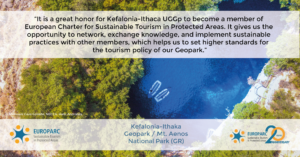
Melissani Cave Geosite, NECCA, Haris Andronos
The Park is both a Geopark, a Dark Sky Park and a National Park, hence, the protection of its natural values is of great importance. Our verifiers were especially positive about the tourism surrounding bird watching in the park, as well as the volunteer activities organised.
Learn more about the Park here.
Gran Paradiso National Park
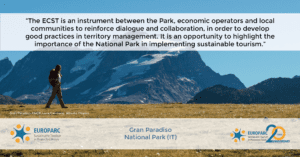
Gran Paradiso PNGP, Luca Giordano, Alberto Olivero
Amongst the many things the Park does to promote sustainable tourism, the quality label is especially inspirational. The National Park assigns this to local tourism, crafts and food operators that produce their products with a high regard to sustainability and quality. You can learn more about the Park and this label here.
Migliarino San Rossore Massaciuccoli Regional Park
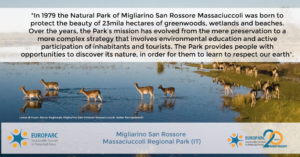
Lame di Fuori, Parco Regionale Migliarino San Rossore Massaciuccoli, Valter Bernardeschi
The great visitor centres in the Park, the excellent relationships with the guides and the agricultural products coming from the Park are just some of the reasons this Italian Park was able to join the ECST Network! You can learn more about the Park here.
Sirente Velino Nature Regional Park
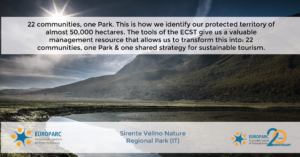
Laghetto del sirente, M. Anselmi
This Park in Italy is worth a sustainable visit! The Park has a well-developed plan for cyclotourism, has created their own “Green Community” and organises an exhibition market of typical, regional products. Learn more about the Park here.
Els Ports Nature Park
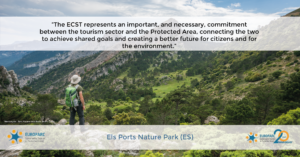
Montsagres, Parc Natural dels Ports, Bruno Duran
This Nature Park is located in the Catalan region of Spain. In Catalonia, there is a firm commitment to the ECST – and it shows! Els Ports has an exhaustive monitoring system, as well as regulation commissions for different outdoor activities like climbing and canyoning. Learn more about the Park here.
Sierra de Santo Domingo Protected Landscape
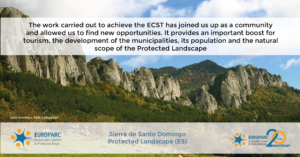
Sant Domingo, Félix Compaired
This Protected Area was declared at the initiative and request of local councils and communities! As such, the stakeholder engagement is incredibly strong. From neigborhoud associations, to collaborations between different county entities.
Re-awarded Parks
The ECST verifiers were also busy in the past year to re-evaluate Parks across Europe. We are incredibly happy to announce the following Parks have successfully prolonged their application:
- Chelmos Vouraikos National Park (GR)
- Gargano National Park (IT)
- Cilento National Park (IT)
- Colli Euganei Regional Park (IT)
- Terras do Lince (PT)
- Sierra Espuña Regional Park (ES)
- Delta de l’Ebre Nature Park (ES)
- Galician Atlantic Islands Maritime-Terrestrial National Park (ES)
- Kullaberg Nature Reserve (SE)
EUROPARC congratulates the Parks, old and new, that are succesfully implementing the ECST. All participating Parks, businnesses and tour operators have made this programme into the strong network it is today.
Star Awards
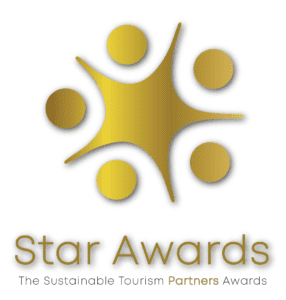 With the Star Awards, we honour those businesses that actively create sustainable offers for tourists. This is the second edition of this award, you can learn more about the 2019 winners here.
With the Star Awards, we honour those businesses that actively create sustainable offers for tourists. This is the second edition of this award, you can learn more about the 2019 winners here.
Business can apply in 4 categories:
- Contribution to Conservation
- Reducing impact on the Environment
- Building my Community
- Communication the values of my Park and my Business
All categories include some questions regarding “Contribution to Conservation“, as it is a fundamental principle of the Charter for Sustainable Tourism. All applications were then considered by an international jury, made up of Sustainable Tourism experts. Get to know the winners!
Trescàlia (ES) – Contribution to conservation
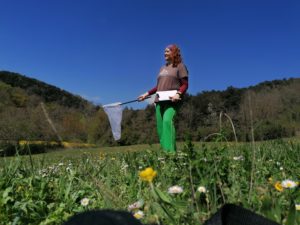
Butterfly monitoring activities organised by Trescalia
Trescàlia provides nature and cultural tours. The company has sustainability at their core. They have been part of the permanent Forum for Sustainable Tourism “Turisme Garrotxa” in the La Zona Volcànica de la Garrotxa Nature Park, since its beginnings in 2013. Within the forum, they help promote the “Garrotxa Experience Catalogue” for tourism agencies. This catalogue contains ecotourism proposals, with all ECST accredited companies in the area!
The International Jury awarded the incoming tourism agency Trescàlia in the Contribution to Conservation Category for their very positive commitment to raising environmental awareness amongst tourists and visitors.
Hotel Gran Rey (ES) – Reducing impacts on the environment
Hotel Gran Rey offers a sustainable place to stay, for all those that want to enjoy a natural holiday.
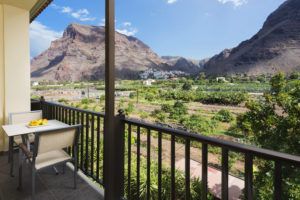
View from the Hotel Gran Rey.
The hotel was created with the philosophy of integrating into the environment. It is located in a landscape formed by steep cliffs, palm groves, springs, and farmhouses. It belongs to the European Charter for Sustainable Tourism in La Gomera since 2011, and as such, works closely together with the Garajonay National Park.
The International Jury awarded the Hotel Gran Rey from La Gomera, because they have done an excellent and well-documented job implementing different measures to reduce water and electricity consumption, recycle and reduce packaging.
Explore Iberia (PT) – Building my community
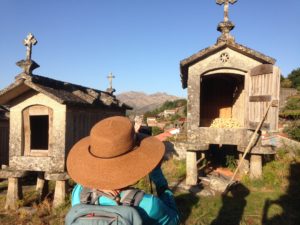
Cultural activities from Explore Iberia.
Explore Iberia is a small independent tour operator that is invested in providing visitors with an authentic experience in Northern Portugal and Galicia. When creating their activities, the team always makes sure to add a “cultural discovery moment”, where interpretation and experiencing the local culture play a key role. From corn bread workshops, to seaweed harvest or traditional pottery painting, visitors can experience the authentic culture of the region, whilst enjoying local food and drinks.
The International Jury awarded the tourism agency and activities provider Explore Iberia for their work as promoters of a consortium of local business.
Pensión Candelaria (ES) – Communicating the values of my Park and Business
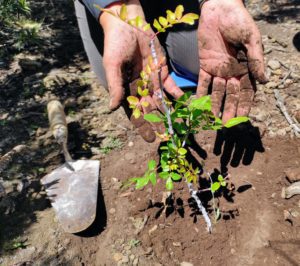
Plantation activities from Pension Candelaria.
Our second winner from the European Charter for Sustainable Tourism in La Gomera: Pensión Candelaria! The staff puts great care into promoting the natural values of the area to their visitors, particular to German tourists. However, the Pensión Candelaria does not just tell the story of the area, they also help maintain it! The staff are active collaborators in the Plántate project. This participatory project promotes the reforestation of thermophilic forests in La Gomera.
The International Jury awarded the accommodation Pensión Candelaria from La Gomera because, despite being a small company, they are very active. They lead, cooperate and communicate about actions and projects linked to environmental problems on the island – fires, reforestation, carbon footprint compensation or beach cleaning.
Projecte Sèpia (ES) – Innovation (special award)
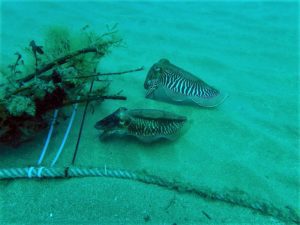
Conservation meassures taken by Projecte Sepia
The PROJECTE SEPIA was born with the aim of improving the breeding conditions of cephalopods and repopulating the waters of the Empordà, Spain. Together with local, artisanal fishermen, the project wants to preserve traditional fishing and promote sustainable practices.
The International Jury decided to create a special award on Innovation to acknowledge the originality of this conservation project and the strong cooperation with fishermen, schools and tourist business.
Hotel Ristorante La Pieja (IT) – Global approach to sustainablity (overall winner)
The hotel and restaurant La Pieja wants to create an “Economy of well-being” centred around

Trail cleaning done by La Pieja
enjoyment and conservation of nature in the area of the Abruzzo National Park. To make that goal a reality, they have created an integrated offer for tourists, that includes nature, culture and outdoor activities. All of this is done in close cooperation with other local operators, guides, and museums. La Pieja regularly meets with the Abruzzo Park Authority and local producers to create common objectives and commitments that ensure adherence to ecological standards.
The International Jury decided to award the Hotel Ristorante La Pieja as the overall winner of the Star Awards 2021-2022 edition for their comprehensive approach to sustainability. Hotel Ristorante La Pieja has been the only one to candidate to all four categories with consistently strong performance across all four.
EUROPARC Congratulates these businesses for leading the way on Sustainable Tourism. Only in working together, can we create tourism that is Good for Nature and Good for People!
Over the coming weeks, we will present the Star Award winners in more detail, with a dedicated article for each.
Webinar: Ways to Wellbeing in Nature
We invite you to the next EUROPARC webinar “Ways to Wellbeing in Nature – Activating Parks and Protected Areas as natural health centres”.
- 14.12.2022
- 10:00 CET
- Participation is free, but registration is needed here
About this webinar
Scientific evidence indicates that people’s health and happiness increase when they are connected with nature. Yet we are experiencing tangible biodiversity loss associated with removal of places for nature being replaced by buildings, industry, roads and other infrastructure, not to mention the challenges of climate change.
Access to nature is essential for human health and Covid-19 lockdowns have unveiled how important green areas are for our mental and physical well-being.
Healthy Parks Healthy People is the Europe-wide programme developed by EUROPARC Federation to supports parks and Protected Areas at the national, regional and local level to deliver better outcomes for the health of people and nature.
In this webinar, we will dive into experiences from Parks and Protected Areas in England and Germany as natural health centres focusing primarily on mental health. We will look at the ‘Five Ways to Wellbeing’ approach to positive mental health and wellbeing in nature and show how the HPHPe toolkit can be a compass to support current and future planning and programme implementation of these and similar initiatives.
The programme
1. Setting the scene – Peter Rawcliffe, EUROPARC Federation Council
Welcome and introduction to the webinar
Five Ways to Wellbeing in nature
2. Case Studies
Connecting communities with nature to help support mental health through Green Social Prescribing – Peak District National Park Authority, England – Jo Hanney, Ranger
Green Care – Nature and Mental Health – Berchtesgadener Land Biosphere Region, Germany – Meike Krebs-Fehrmann, Scientific Officer
3. Using the HPHPe Toolkit to realise health projects – Bridget Finton, NatureScot
4. Final questions and conclusions – Peter Rawcliffe, EUROPARC Federation Council
Our speakers
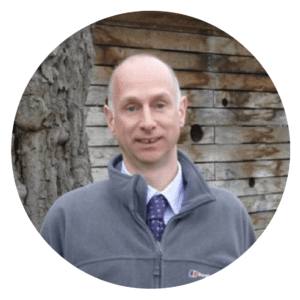
Peter Rawcliffe – Head of People and Places Activity in NatureScot, and Chair of EUROPARC Federation’s Health and Protected Areas Commission
Peter Rawcliffe is both EUROPARC Federation Council Member and Vice-President. Additionally, he is a member of the IUCN specialist group on health and wellbeing and part of the current working group on COVID19 and Protected Areas. He has over 25 years of work experience and comes from a background of academic qualifications in the environmental and political sciences (BSc and PhD), consultancy work on planning, transport and conservation policy, and environmental education.

Jo Hanney – Learning and Discovery Ranger, Peak District National Park Authority (PDNPA)
Jo Hanney has over 20 years’ experience of creating and delivering engagement opportunities for the PDNPA. She is a skilled facilitator with experience of connecting with a wide range of audiences. She currently leads on the delivery of the “Health and Wellbeing” strand of the PDNPA’s Diverse Audience Plan (2020-2024); one of the outcomes of this is “A National Park loved and supported by diverse audiences”. She is happiest when she is out and about in nature in the Peak District National Park introducing this protected landscape to new audiences.


